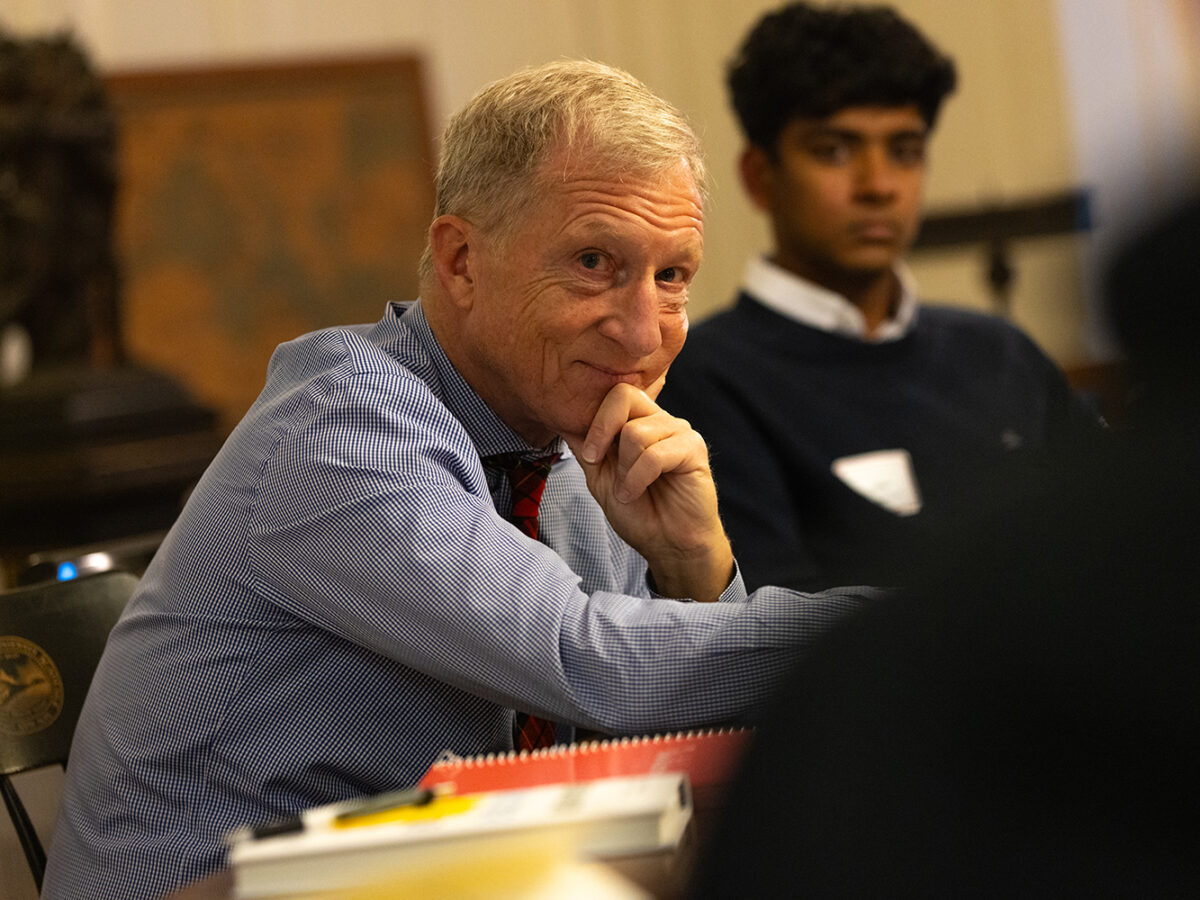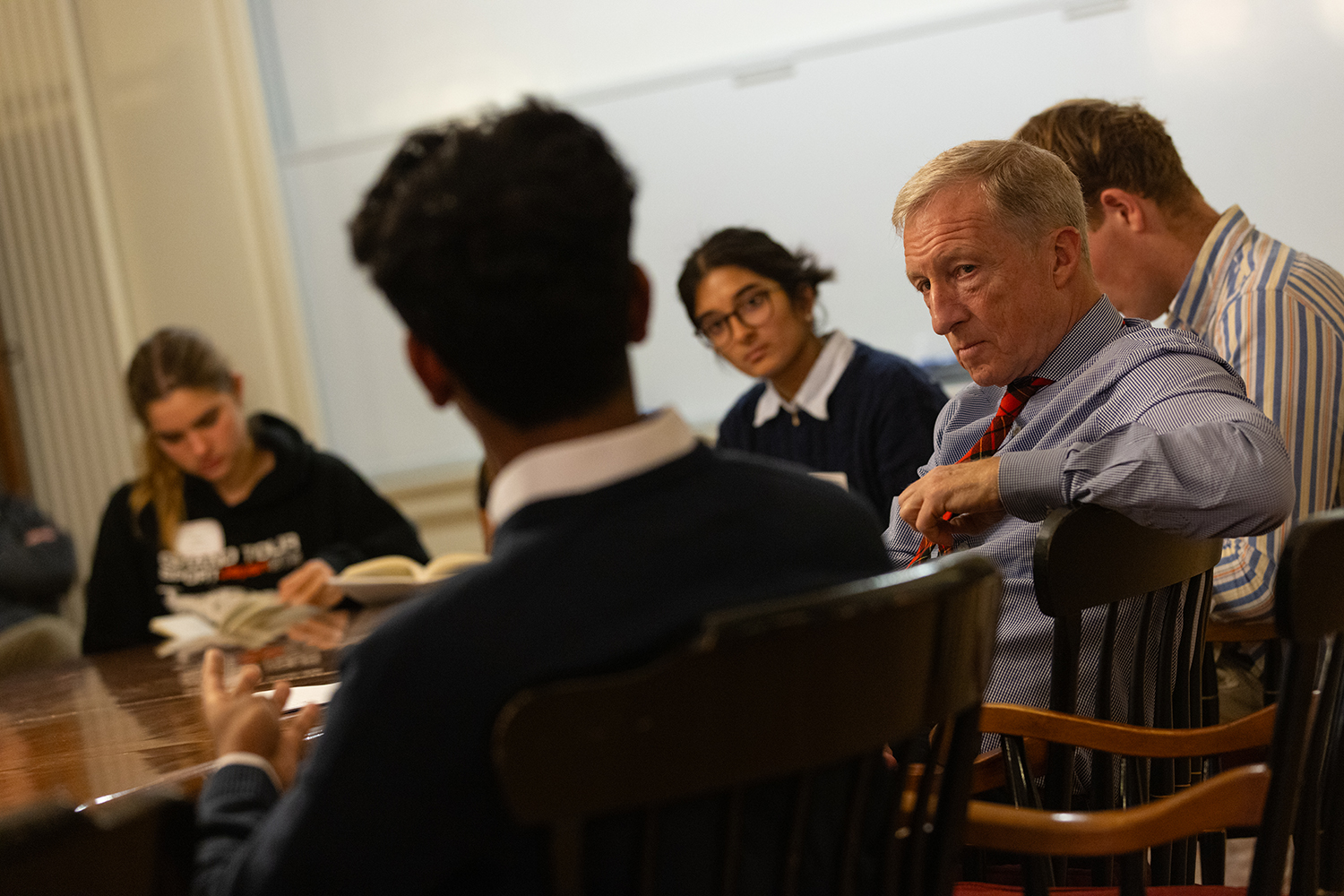Tom Steyer ’75 asks Exeter ‘Do you love the world?’

Investor and activist believes we can win the war on climate.
When Tom Steyer ’75 gathered with Exeter students recently to discuss climate change, his challenge was not to explain the complexities of the issue. It was to get a word in edgewise.
The spirited discussion around a Harkness table in the Latin Study included a dozen students who are passionate about — and well-versed in — the subject, and their recent reading of Steyer’s new book “Cheaper Faster Better: How We’ll Win the Climate War” only fueled their enthusiasm.
Few people are as fervent about exposing the threat of the changing climate as Steyer. In 2013, he walked away from the multi-billion-dollar hedge fund he founded to dedicate himself to raising awareness and exploring solutions to what he considers “the greatest threat of our lifetime.” He started a regenerative ranch to show you can raise cattle and still have a negative carbon footprint. He co-founded a climate investment firm to unlock the potential of the transition to clean energy. He donated more than a quarter of a billion dollars to candidates and campaigns similarly devoted to the cause. And, in 2020, when he decided those candidates were not as focused on the issue as they needed to be, he ran in the Democratic primary for president.
Steyer was back on campus — where 50 years ago he was a proud Cilley boy for three years before serving as a proctor in Gould House his senior year — to address assembly and meet with students from clubs focused on sustainability. The conversation around the table launched with a question from a student about animal agriculture’s effects on global warming, and the dialogue was off and running.
The discussion returned more than once to the “cheaper” part of Steyer’s “Cheaper Faster Better” title; that is, the need to incentivize people — and more specifically, Americans — in their wallets. Steyer took the example of Texas’ development of solar energy. The nation’s biggest oil-producing state is about to surpass California as the leading solar producer; between 2014 and 2023, Texas’ share of total U.S. solar power increased from roughly 1.5% to approximately 17%.

“No one did it to be nice,” Steyer said. “They did it to save money.”
Ultimately, what will motivate people — and corporations — is self-interest. “People won’t do this sweetheart, beautiful thing for the planet, they’ll do this sweetheart, beautiful thing for themselves.”
That’s not a very non-sibi outlook to embrace, and the questions Steyer wants Exeter students to ask themselves are the same questions he asked himself when he embarked on his career sea change: “How do you think about yourselves? Do you love the world? Do you care about other people?”
“We all want to have a purpose in life; that there’s something we’re doing on this planet beyond how much money we’re making or what size house we live in.”
Steyer remains an optimist that humankind will respond to the crisis, likening it to the way the U.S. and the world rose to meet the moment in World War II. In his book, he writes, “in the face of the greatest threat our planet had ever faced, we didn’t lose our nerve or our self-confidence. …We transformed ourselves, on the battlefield and the home front.”
It didn’t happen by accident then and won’t today, he said.
“I don’t see how we’ll succeed in this without trying to succeed,” he told the students. “If everyone does their part, we’re going win.”